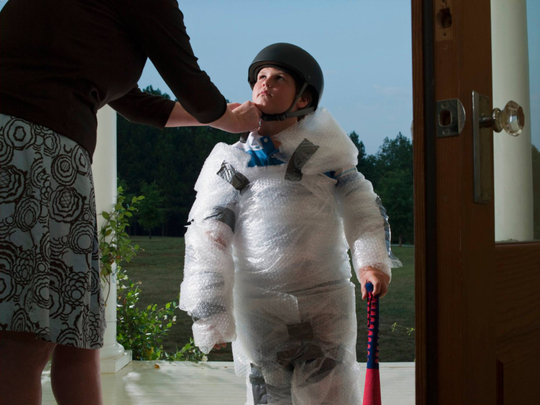
Communicate, don’t test them
Challenging children while equally supporting them is the best way. Making sure they understand the pros and cons of things they do, can help them to think and act — and that’s another important attitude to be developed. Not all children will be equally efficient in problem solving. Parents should understand the child’s capability and teach them tasks accordingly.
Encouragement is an important aspect. Lack of encouragement can make children doubtful of their abilities and knowledge. Parents can communicate with them properly, rather than test them. We can enquire how aware they are, about reacting to different emergency situations. Parental supervision is essential, but not in a way that causes children to be spoon-fed.
From Ms Atheena Mohammad C.
UAE
Let them out
Children should be allowed to do their work independently in order to take care of themselves. But, most of the parents are worried that if they are left to themselves, they may land into trouble. But, they could be allowed to go to the market nearby or meet up with friends. This would give children confidence, as well as help in their future development. They should know how to protect themselves in emergencies.
From Mr K. Ragavan
Bengaluru, India
Too many incidents
I wonder why troubling incidents are happening, related to children falling off high rise buildings. Supervision should be made a priority, much more than before. Working parents should have alternate arrangements at home to take care of their children, especially while they are small. It is not only about parental supervision at home, but wherever possible, children should be safeguarded by someone.
I noticed a recent incident at a supermarket store, where a young child was crying and looking around for his parents. People were in a hurry shopping and paid no attention to the child, but he caught my attention. By the time I followed him silently, I noticed that a teenage girl was observing the boy’s movements and trying to find his parents. I believe he should not have been left alone. It is parents’ responsibility to protect their children until they realise how to protect themselves.
From Mr Ramachandran Nair
Oman
More harm than good
Bubble wrapping children would do more harm than good. Children, as they grow up, tend to learn from circumstances and it’s this exposure that nurtures them into fine individuals. It’s parental negligence, which has been a cause lately in accidents, and that’s why they are called ‘accidents’. So, being overbearing towards a child would make it difficult for him/her to survive during later stages in life.
From Mr Yasser N.
UAE
Encourage problem solving
Once children know what is or isn’t allowed, they can start to identify, evaluate and select appropriate solutions to their problems. They have to understand their emotions. Solutions come from ideas. To generate these ideas, children need to learn to think creatively. Parents should encourage their children to make an attempt to solve their own problems, as appropriate for their age, and they should guide them.
From Ms Shirin Mihiraji
Melbourne, Australia
It’s how you supervise
Since children of today are well-aware and knowledgeable, there is now a greater responsibility on parents. No matter how well-aware, knowledgeable or informative a child might be, he/she can in no way compensate for experience and wisdom.
However, a certain amount of liberty and independence should be given to children so that they are not spoon-fed. It differs, by age. A toddler might appreciate the supervision, whereas a teenager would look forward to a bit of privacy. Now, supervision should mean letting the child explore, but allowing for a parent to be in the vicinity, in case there is a need for support. Wait for the call for help, and allow them to try on their own.
I think mothers need to be at home 24/7 and be fresh, energetic, motivated and positive, to provide the appropriate level of care and monitoring. So, in my opinion, the problem is not in having constant supervision — it’s all about the way you supervise.
From Ms Mumtazunnisa Khan
UAE
Gradual steps gain confidence
Parents are concerned about their children’s upbringing, which is why they always keep a close eye on their activities and the friends they keep. However, at times, parents become over-cautious, which is acceptable until the children are in their teens or early twenties. However, beyond this age, when the child becomes an adult and finishes university and enters professional life, parents must give them room to think on their own. Parents who are extremely cautious seldom think that their constant monitoring is hurting their child’s self-confidence. Such children become unaware of how to tackle people and events, when their parents are not around them. Moreover, children having cautious parents tend to look for their help in all matters and do not use their own judgment, hence turning them into less confident adults or people who have self-esteem issues.
Parents can take children on outings and let their children buy snacks and tickets on their own, so that they develop confidence. By taking gradual steps, parents can instil confidence in their child while the child becomes equally aware of his/her abilities and gather confidence and experience to make decisions based on his/her own judgment.
From Mr M. Omar Iftikhar
Karachi, Pakistan
Editors’ note: Is there a news report that you feel strongly about? Something that has to be addressed in the community and requires resolution? Email us on readers@ gulfnews.com. You can also post a comment on our Facebook page or tweet us @GNReaders.












